The preposition
英语介词用法大全

英语介词用法大全 TTA standardization office【TTA 5AB- TTAK 08- TTA 2C】介词(The Preposition)又叫做前置词,通常置于名词之前。
它是一种虚词,不需要重读,在句中不单独作任何句子成分,只表示其后的名词或相当于名词的词语与其他句子成分的关系。
中国学生在使用英语进行书面或口头表达时,往往会出现遗漏介词或误用介词的错误,因此各类考试语法的结构部分均有这方面的测试内容。
1. 介词的种类英语中最常用的介词,按照不同的分类标准可分为以下几类:(1). 简单介词、复合介词和短语介词①.简单介词是指单一介词。
如:at , in ,of ,by , about , for, from , except , since, near, with 等。
②. 复合介词是指由两个简单介词组成的介词。
如:Inside, outside , onto, into , throughout, without , as to as for , unpon, except for 等。
③. 短语介词是指由短语构成的介词。
如:In front of , by means o f, on behalf of, in spite of , by way of , in favor of , in regard to 等。
(2). 按词义分类{1} 表地点(包括动向)的介词。
如:About ,above, across, after, along , among, around , at, before, behind, below, beneath, beside, between , beyond ,by, down, from, in, into , near, off, on, over, through, throught, to, towards,, under, up, unpon, with, within , without 等。
七年级上册英语好词摘抄大全人教版
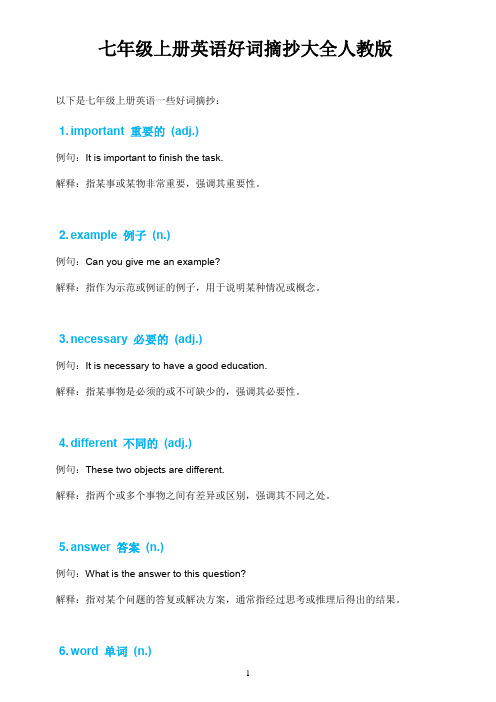
七年级上册英语好词摘抄大全人教版以下是七年级上册英语一些好词摘抄:1. important 重要的(adj.)例句:It is important to finish the task.解释:指某事或某物非常重要,强调其重要性。
2. example 例子(n.)例句:Can you give me an example?解释:指作为示范或例证的例子,用于说明某种情况或概念。
3. necessary 必要的(adj.)例句:It is necessary to have a good education.解释:指某事物是必须的或不可缺少的,强调其必要性。
4. different 不同的(adj.)例句:These two objects are different.解释:指两个或多个事物之间有差异或区别,强调其不同之处。
5. answer 答案(n.)例句:What is the answer to this question?解释:指对某个问题的答复或解决方案,通常指经过思考或推理后得出的结果。
6. word 单词(n.)例句:I don't know this word.解释:指英语中的一个词汇,用于表达某种概念、事物或想法。
7. sentence 句子(n.)例句:Can you complete this sentence?解释:指由一个或多个单词组成的完整表达,用于表达某种意思、想法或情感。
8. subject 主语(n.)例句:The subject of the sentence is "I".解释:指句子中表达动作或行为的发出者的成分,通常位于句子的开头。
9. predicate 谓语(n.)例句:The predicate of the sentence is "am".解释:指句子中表达动作或行为的动词部分,通常与主语搭配使用。
10. question 问题(n.)例句:I have a question to ask.解释:指需要解答或讨论的问题,通常涉及某种疑问或困惑。
英语作文用到的方位词
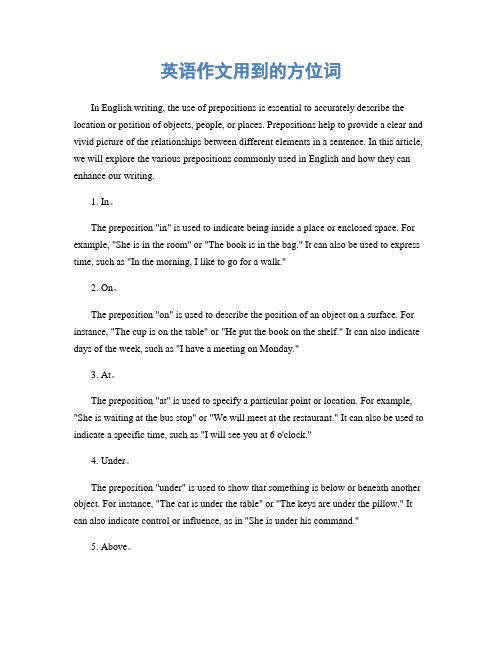
英语作文用到的方位词In English writing, the use of prepositions is essential to accurately describe the location or position of objects, people, or places. Prepositions help to provide a clear and vivid picture of the relationships between different elements in a sentence. In this article, we will explore the various prepositions commonly used in English and how they can enhance our writing.1. In。
The preposition "in" is used to indicate being inside a place or enclosed space. For example, "She is in the room" or "The book is in the bag." It can also be used to express time, such as "In the morning, I like to go for a walk."2. On。
The preposition "on" is used to describe the position of an object on a surface. For instance, "The cup is on the table" or "He put the book on the shelf." It can also indicate days of the week, such as "I have a meeting on Monday."3. At。
[prefer的用法总结]prefer的用法
![[prefer的用法总结]prefer的用法](https://img.taocdn.com/s3/m/073190727ed5360cba1aa8114431b90d6c8589c2.png)
[prefer的用法总结]prefer的用法prefer的用法篇一:常用的英语单词与句子常用的英语单词与句子如下:1. The loser closely enclosed himself in the closet.那个失败者把自己严密地封闭在小室内。
loser [ "lu:z ] n. 失败者,遗失者closely [ "kluzli ] ad. 接近地enclose [ in"kluz ] v. 围绕,放入封套,装[计算机] 括入closet [ "klzit ] n. 壁橱,小室a. 秘密的,空论的2. The poser was proposed to pose his position into ponents.作曲家被建议将著作分解成单元。
poser [ km"puz ] n. 作曲家propose [ pr"puz ] v. 计划,打算,向...提议pose [ di:km"puz ] v. 分解position [ kmp"zin ] n. 作文,著作,组织,合成物,成份ponent [ km"punnt ] n. 元件,组件,成份a. 组成的,构成的3. Suppose you were exposed in the opposite position by your opponent, ...假设你被对手暴露在相反的位置,....suppose [ s"puz ] v. 推想,假设,以为,认为应该,获准(besuppose to),让(虚拟语气)opposite [ "pzit ] a. 相对的,相反的,对面的prep. 对面expose [ iks"puz ] v. 暴露,揭穿,陈列position [ p"zin ] n. 位置,职位,状态v. 安置,决定...的位置opponent [ "punnt ] n. 对手,敌手,反对者a. 敌对的,反对的4. The depositor positively positioned the preposition in that position on purpose.储户有意确信地介词放置在那个位置。
about、after、at、for、from的用法 -回复

about、after、at、for、from的用法-回复Introduction:In this article, we will explore the various uses and meanings of the prepositions "about", "after", "at", "for", and "from". These prepositions are commonly used in the English language to indicate different relationships between objects, time, location, and purpose. Understanding their correct usage is essential for effective communication.1. About:The preposition "about" is used to indicate the subject of a conversation, discussion, or writing. It introduces the topic or theme. For example, you might say, "We are talking about the importance of education." In this sentence, "about" establishes the subject of the conversation as education. Similarly, "about" can be used to denote the content of a book, movie, or article. For instance, "The movie is about a young girl's journey toself-discovery."2. After:The preposition "after" primarily indicates a sequence in time. It isused to signify something that occurs or follows a previous event or action. For instance, "After finishing his homework, John went to play basketball." Here, "after" clarifies the order of events, showing that John completed his homework before engaging in basketball. Additionally, "after" can be used to indicate a time lag, such as "She received the results after weeks of waiting."3. At:The preposition "at" is versatile and can serve various purposes. It is commonly used to indicate a specific location or place. For example, "She is waiting at the bus stop." In this sentence, "at" specifies the exact location where the person is waiting. Moreover, "at" can indicate a particular time, such as "The meeting is scheduled at 2 p.m." Here, "at" denotes the exact time the meeting will commence.4. For:The preposition "for" is used to express the recipient, purpose, or duration of an action. When indicating the recipient, it suggests that something is intended or designated for a particular person or group. For instance, "I bought a gift for my mother." In this sentence, "for" indicates that the gift is intended for the person'smother. Furthermore, "for" can denote the purpose behind an action, such as "I am studying for the exam." Here, "for" shows that the studying is being done in preparation for the exam. Lastly, "for" can indicate the duration of an action, as in "He practiced piano for two hours."5. From:The preposition "from" is used to indicate the point of origin or source of something. It denotes movement or separation. For instance, "I received a letter from my friend." In this example, "from" signifies that the letter originated or was sent by the person's friend. Moreover, "from" can indicate the starting point of a journey or a location, as in "I am traveling from New York to Los Angeles."Conclusion:In this article, we have explored the uses and meanings of the prepositions "about", "after", "at", "for", and "from". These prepositions are crucial in conveying specific relationships between objects, time, location, and purpose. Understanding how to usethem correctly enhances our ability to communicate effectively in the English language.。
英语创新竞赛试题及答案
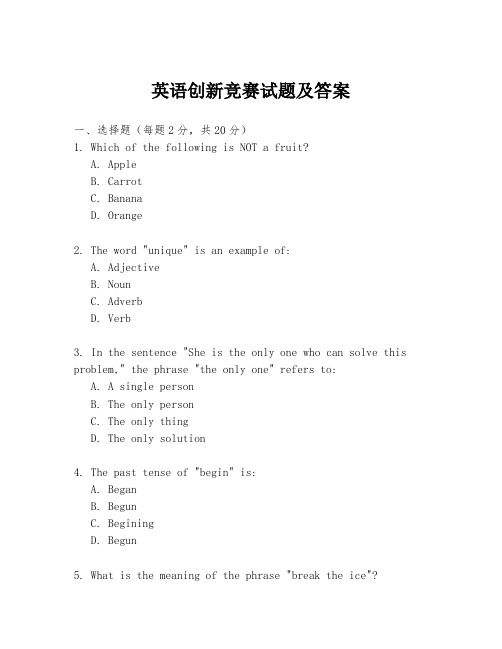
英语创新竞赛试题及答案一、选择题(每题2分,共20分)1. Which of the following is NOT a fruit?A. AppleB. CarrotC. BananaD. Orange2. The word "unique" is an example of:A. AdjectiveB. NounC. AdverbD. Verb3. In the sentence "She is the only one who can solve this problem," the phrase "the only one" refers to:A. A single personB. The only personC. The only thingD. The only solution4. The past tense of "begin" is:A. BeganB. BegunC. BeginingD. Begun5. What is the meaning of the phrase "break the ice"?A. To stop the ice from meltingB. To make a hole in the iceC. To initiate a conversationD. To cool down the room6. The opposite of "agree" is:A. DisagreeB. AgreeC. LikeD. Dislike7. The phrase "at a loss" means:A. Confused or not knowing what to doB. Winning a prizeC. Having a profitD. Losing something8. The word "elaborate" when used as a verb means:A. To make something simpleB. To make something more complicatedC. To make something more detailedD. To make something less detailed9. The preposition "beside" is used to indicate:A. TimeB. PlaceC. ComparisonD. Purpose10. The idiom "barking up the wrong tree" means:A. Making a mistakeB. Planting a treeC. Being very loudD. Following the right path二、填空题(每空1分,共10分)11. The word "____" means "very small."A. TinyB. LargeC. BigD. Small12. "____" is used to express agreement with a statement.A. YesB. OkayC. IndeedD. No13. The phrase "____" can be used to describe a person who is very careful and precise.A. A stickler for detailB. A detail-oriented personC. A careless personD. A person with no attention to detail14. The word "____" is used to describe something that is very old.A. NewB. OldC. AncientD. Recent15. "____" is a phrase used to express that something is not important or serious.A. No big dealB. A big issueC. A serious matterD. A major concern三、阅读理解(每题3分,共15分)Read the following passage and answer the questions.Passage:Innovation is the key to progress. It drives the development of technology and society. Without innovation, we would still be using outdated methods and tools. Innovations can come from various fields, such as science, technology, art, and even everyday life. They can be simple or complex, but they all contribute to making our lives better.16. What is the main idea of the passage?A. The importance of innovationB. The history of innovationC. The types of innovationD. The process of innovation17. According to the passage, what can drive the development of technology and society?A. Old methods and toolsB. Outdated practicesC. New ideas and methodsD. Traditional ways of thinking18. The passage suggests that innovations can come from:A. One specific fieldB. Various fieldsC. Only from scientistsD. Only from artists19. What does the passage say about the nature of innovations?A. They are always complexB. They are always simpleC. They can be simple or complexD. They are never simple20. The passage implies that innovations contribute to:A. Making our lives worseB. Making our lives the sameC. Making our lives betterD. Making our lives more complicated四、作文(15分)21. Write an essay on the topic "The Role of Innovation in Modern Society." Your essay should be at least 200 words and should include an introduction, body paragraphs, and a conclusion.五、答案1. B。
介词the的用法口诀
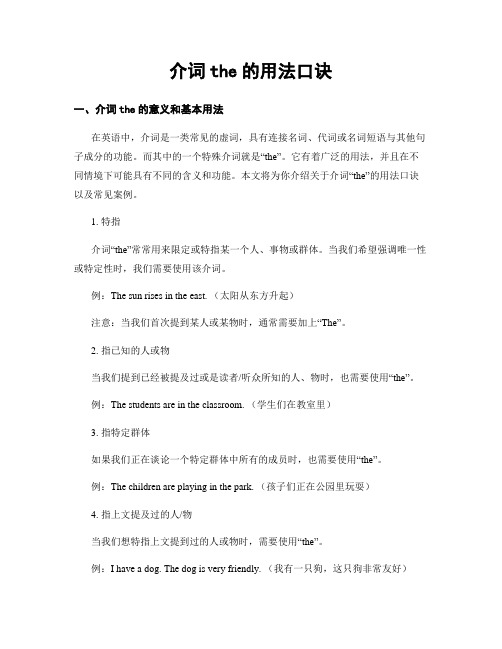
介词the的用法口诀一、介词the的意义和基本用法在英语中,介词是一类常见的虚词,具有连接名词、代词或名词短语与其他句子成分的功能。
而其中的一个特殊介词就是“the”。
它有着广泛的用法,并且在不同情境下可能具有不同的含义和功能。
本文将为你介绍关于介词“the”的用法口诀以及常见案例。
1. 特指介词“the”常常用来限定或特指某一个人、事物或群体。
当我们希望强调唯一性或特定性时,我们需要使用该介词。
例:The sun rises in the east. (太阳从东方升起)注意:当我们首次提到某人或某物时,通常需要加上“The”。
2. 指已知的人或物当我们提到已经被提及过或是读者/听众所知的人、物时,也需要使用“the”。
例:The students are in the classroom. (学生们在教室里)3. 指特定群体如果我们正在谈论一个特定群体中所有的成员时,也需要使用“the”。
例:The children are playing in the park. (孩子们正在公园里玩耍)4. 指上文提及过的人/物当我们想特指上文提到过的人或物时,需要使用“the”。
例:I have a dog. The dog is very friendly. (我有一只狗,这只狗非常友好)5. 表示乐器、器官等介词“the”还经常用于表示乐器、器官等特定的事物。
例:He plays the piano. (他弹钢琴)注意:但是当表示某人的技能或能力时,通常不需要加上“The”。
正确例子:She can play piano very well. (她弹钢琴弹得很好)错误例子:She can play the piano very well.6. 表示方向/运输工具介词“the”也可以用于表示方向或运输工具。
例:He walked to the end of the street and turned left. (他走到街道尽头后左转)例:He went to school by bus.(他坐公交车去学校)二、其他用法及注意事项除了以上介绍的基本用法外,还有一些特殊情况需要注意。
高三下学期英语课件-短文改错

6.连词 (The Conjunction)
This man might need the umbrella himself, and he preferred to give it to someone else.
but
7.动词 (The Verb)
动词错误主要有:①时态和语态的误用; ②及物和不及物动词误用;③动词宾语形式错 误;④主语和谓语的不一致等。 就此问题,需要把握文中动词时态的主旋 律,搞清主动与被动,熟记某些动词的宾语形 式并且全面理解有关主谓一致的规则。
5.介词 (The Preposition)
I asked my father the money.
for
[2009海南/宁夏高考]
6.连词 (The Conjunction)
连词错误指连词的缺失及错用。连词 误用包括表示转折、因果、并列、递进等 关系词的误用,解答时不仅要注意把握词 与词、句与句或段与段之间的关系,有时 还要排除汉语影响。
二、逻辑错误
The angel touched his eyes, but he could
and
see everything clea定句型、句 式或习惯用语的错用。做此类题首先要准 确掌握句型、句式或习惯用语的正确形式 和确切含义,然后判断是否有多用、漏用 和错用介词、副词、连词、冠词等情况。
辽 宁 卷
海 南 / 宁 夏
09
1
1
2
1
1
1
1
1
1
09
1
1
2
1
2
1
1
1
08
1
1
2
1
1
2
1
1
【答疑】except vs. except for
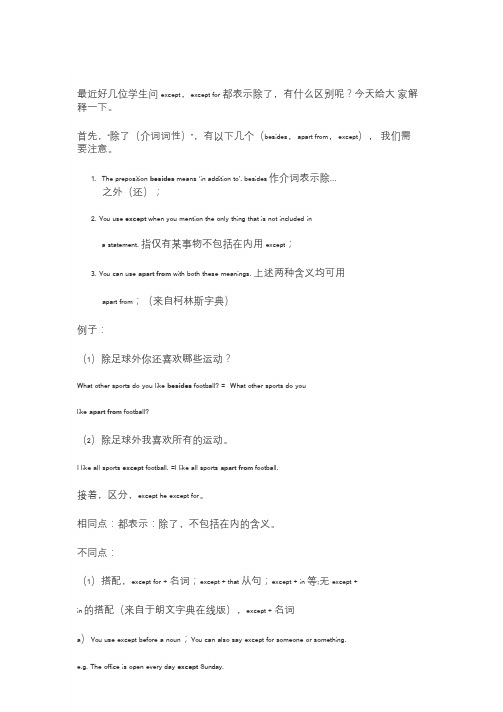
最近好几位学生问except,except for 都表示除了,有什么区别呢?今天给大家解释一下。
首先,“除了(介词词性)”,有以下几个(besides,apart from,except),我们需要注意。
1. The preposition besides means ‘in addition to’. besides作介词表示除…之外(还);2. You use except when you mention the only thing that is not included ina statement. 指仅有某事物不包括在内用except;3. You can use apart from with both these meanings. 上述两种含义均可用apart from;(来自柯林斯字典)例子:(1)除足球外你还喜欢哪些运动?What other sports do you like besides football? = What other sports do youlike apart from football?(2)除足球外我喜欢所有的运动。
I like all sports except football. =I like all sports apart from football.接着,区分,except he except for。
相同点:都表示:除了,不包括在内的含义。
不同点:(1)搭配,except for + 名词;except + that 从句;except + in 等;无except +in的搭配(来自于朗文字典在线版),except + 名词a)You use except before a noun;You can also say except for someone or something.e.g. The office is open every day except Sunday.=The shop is open every day except for Sunday.She invited everyone except for Tom. = She invited everyone except Tom.(2)在句子开头时,只能用except + for或者其他介词经典例题:例如:I never knew much about her except for that she was strange.(改错)去掉for,因为except + that从句;except for 不能加从句。
英语介词
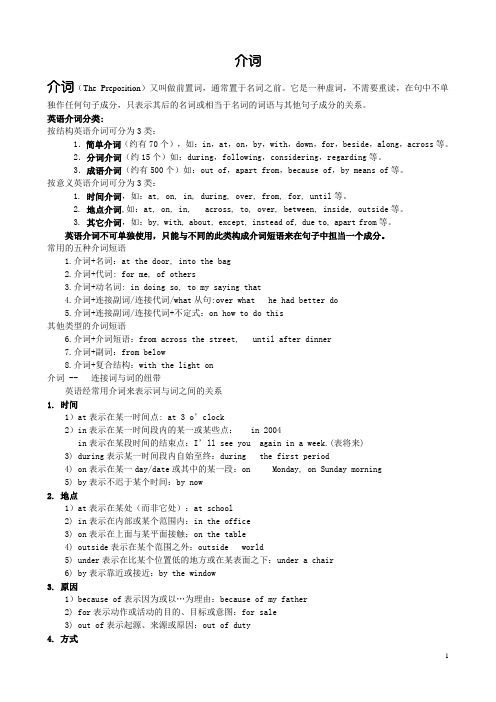
介词介词(The Preposition)又叫做前置词,通常置于名词之前。
它是一种虚词,不需要重读,在句中不单独作任何句子成分,只表示其后的名词或相当于名词的词语与其他句子成分的关系。
英语介词分类:按结构英语介词可分为3类:1.简单介词(约有70个),如:in,at,on,by,with,down,for,beside,along,across等。
2.分词介词(约15个)如:during,following,considering,regarding等。
3.成语介词(约有500个)如:out of,apart from,because of,by means of等。
按意义英语介词可分为3类:1.时间介词,如:at, on, in, during, over, from, for, until等。
2. 地点介词,如:at, on, in, across, to, over, between, inside, outside等。
3. 其它介词,如:by, with, about, except, instead of, due to, apart from等。
英语介词不可单独使用,只能与不同的此类构成介词短语来在句子中担当一个成分。
常用的五种介词短语1.介词+名词:at the door, into the bag2.介词+代词: for me, of others3.介词+动名词: in doing so, to my saying that4.介词+连接副词/连接代词/what从句:over what he had better do5.介词+连接副词/连接代词+不定式:on how to do this其他类型的介词短语6.介词+介词短语:from across the street, until after dinner7.介词+副词:from below8.介词+复合结构:with the light on介词 -- 连接词与词的纽带英语经常用介词来表示词与词之间的关系1. 时间1)at表示在某一时间点: at 3 o’clock2)in表示在某一时间段内的某一或某些点: in 2004in表示在某段时间的结束点:I’ll see you again in a week.(表将来)3) during表示某一时间段内自始至终:during the first period4) on表示在某一day/date或其中的某一段:on Monday, on Sunday morning5) by表示不迟于某个时间:by now2. 地点1)at表示在某处(而非它处):at school2) in表示在内部或某个范围内:in the office3) on表示在上面与某平面接触:on the table4) outside表示在某个范围之外:outside world5) under表示在比某个位置低的地方或在某表面之下:under a chair6) by表示靠近或接近:by the window3. 原因1)because of表示因为或以…为理由:because of my father2) for表示动作或活动的目的、目标或意图:for sale3) out of表示起源、来源或原因:out of duty4. 方式1)with表示以…方式:with skill2)in表示以某种方式: in French, in cash, in this way3) by表示方法、手段: by the back road, by bus, by working hard4) on表示运送方式:on a train, on foot5) in表示途径或材料: in oils一、In介词prep.1.表示位置:在…里面; 在, 于; 在…部位上I could feel the tension in the room.我可以感觉到房间里的紧张气氛。
language notes翻译

language notes翻译"language notes"翻译为"语言注释",它指的是在学习一门语言时,为了帮助学习者更好地理解和运用语言,提供的关于语法、词汇、用法等方面的注释和说明。
下面是一些例句,展示了中英文对照的语言注释:1. The word "run" can be used both as a verb and a noun. (动词和名词)单词"run"既可以用作动词也可以用作名词。
2. In English, adjectives are usually placed before nouns. (形容词位置)在英语中,形容词通常放在名词前面。
3. The present perfect tense is used to talk about past actions that have a connection to the present. (现在完成时)现在完成时用来谈论与现在有关联的过去动作。
4. In Mandarin Chinese, measure words are used to quantify nouns. (量词)在汉语中,量词用来量化名词。
5. The expression "to make a difference" means to have a positive impact or effect. (固定表达)表达"to make a difference"意味着产生积极的影响或效果。
6. The preposition "by" can indicate the method or means of doing something. (介词用法)介词"by"可以表示做某事的方法或手段。
在…的南方的英文两种表达
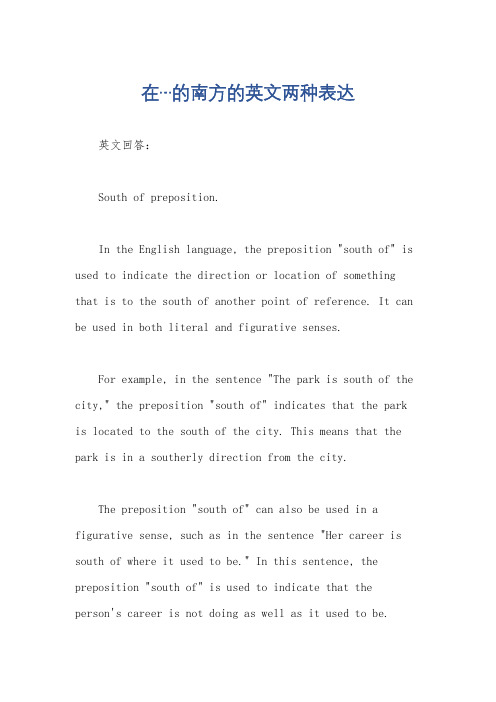
在…的南方的英文两种表达英文回答:South of preposition.In the English language, the preposition "south of" is used to indicate the direction or location of something that is to the south of another point of reference. It can be used in both literal and figurative senses.For example, in the sentence "The park is south of the city," the preposition "south of" indicates that the park is located to the south of the city. This means that the park is in a southerly direction from the city.The preposition "south of" can also be used in a figurative sense, such as in the sentence "Her career is south of where it used to be." In this sentence, the preposition "south of" is used to indicate that theperson's career is not doing as well as it used to be.South of prepositional phrase.In addition to the preposition "south of," the prepositional phrase "to the south of" can also be used to indicate the direction or location of something that is to the south of another point of reference. The prepositional phrase "to the south of" is more formal than thepreposition "south of," but it has the same meaning.For example, in the sentence "The park is to the southof the city," the prepositional phrase "to the south of" indicates that the park is located to the south of the city. This means that the park is in a southerly direction from the city.The prepositional phrase "to the south of" can also be used in a figurative sense, such as in the sentence "Her career is to the south of where it used to be." In this sentence, the prepositional phrase "to the south of" isused to indicate that the person's career is not doing as well as it used to be.中文回答:介词 south of.在英语中,介词 "south of" 用于表示某个物体的方向或位置在其参考点以南。
from介词的用法

from介词的用法The preposition "from" has several uses in English:1. Origin or source: It indicates the point of departure or starting point. For example:- I am from China.- The book is from the library.2. Separation or distance: It shows the point of separation or the distance between two objects or locations. For example:- The shop is located five blocks from my house.- He lives far from the city center.3. Time reference: It denotes the starting point or beginning of a time period. For example:- The store is open from 9 am to 5 pm.- The exhibition will run from June to August.4. Cause or reason: It indicates the cause or reason for something. For example:- He suffers from allergies.- The tree fell down from strong winds.5. Removal or exclusion: It suggests the removal or exclusion of something or someone. For example: - Please remove the sticker from the window.- They expelled him from the club.6. Function or purpose: It indicates the function or purpose of something. For example:- I bought a gift for my friend.- This pen is for writing.These are just a few examples of the many uses of the preposition "from" in English.。
preposition的用法

preposition的用法Prepositions(介词)是英语中非常重要且常用的一类词汇,它们在句子中起连接和修饰作用。
本文将详细介绍preposition的用法,并探讨它在不同语境下的应用。
一、什么是prepositions?Prepositions是一类位于名词、代词或动词之前,起到连接作用的词语。
它们通常表达地点、时间、目的、方式和关系等概念。
总体来说,prepositions扮演着连接各个句子成分的桥梁角色,为我们提供了丰富的表达方式。
二、位置和搭配1. 在句子中,preposition通常位于与其相关的名词或代词之前。
例如:- I live in a big city.(我住在一个大城市里。
)- She went to the store.(她去了商店。
)2. Prepositions也可以和动词搭配使用,形成短语动词。
例如:- Give up(放弃)- Look for(寻找)3. Prepositions还经常与特定形容词相结合,构成习惯搭配。
例如:- Interested in(对...感兴趣)- Proud of(为...而自豪)三、常见的preposition及其运用下面是一些常见的prepositions及其在句子中的使用情况。
1. 表达地点的prepositions:- In:表示在较大、封闭、有界限的空间内。
例如:I am in the classroom.(我在教室里。
)- At:表示在某个具体的地点。
例如:She is waiting at the bus stop.(她正在车站等候。
)- On:表示在表面之上。
例如:The book is on the table.(书放在桌子上。
)2. 表达时间的prepositions:- On:表示特定日期或星期几。
例如:We are going to have a party on Friday.(我们将在星期五举行派对。
at,to,for的用法

at,to,for的用法At, To, For的用法IntroductionIn English grammar, the prepositions "at," "to," and "for" play important roles in indicating time, place, direction, and purpose. Each of these prepositions carries its own meaning and usage. This article aims to explore their individual uses and provide examples to help readers gain a better understanding of when to use each one.I. AtThe preposition "at" is often used to indicate location, time, or a specific event. Here are some common ways "at" is used:1. Location:- I am at home.- She works at a coffee shop.2. Time:- The meeting starts at 9 AM.- We'll meet at noon.3. Specific Events:- We will celebrate Christmas at my friend's house.- The concert will be held at the city stadium.II. To"To" primarily expresses movement or direction toward a particular point or goal. It is commonly used in the following ways:1. Movement/Direction:- I walked to the park.- He drove to the airport.2. Goal/Purpose:- I went to the market to buy groceries.- They traveled to Italy to explore ancient ruins.3. Time Expressions:- Let's meet for lunch at 12 PM.- They arrived late due to heavy traffic.III. ForThe preposition "for" has versatile uses and can indicate purpose, duration, beneficiary, or exchange among other things:1. Purpose:- He studies for his exams diligently.- She bought flowers for her mother's birthday.2. Duration:- They have been waiting for hours.- The movie lasted for two hours.3. Beneficiary/Recipient:- John bought a gift for his girlfriend.- We prepared dinner for our guests.4. Exchange/Substitution:- Can you lend me your pen for a moment?- I exchanged my old mobile phone for a new one.ConclusionUnderstanding the correct usage of prepositions is crucial for effective communication in English. "At," "to," and "for" are three commonly used prepositions that carry specific meanings and contexts. While "at" indicates location, time, or specific events, "to" denotes movement, direction, or purpose. On the other hand, "for" encompasses purpose, duration, beneficiary, and exchange. By mastering the usage of these prepositions, learners can enhance their language skills and convey their intended message accurately.。
介宾短语宾语补足语

介宾短语宾语补足语介绍介宾短语(Prepositional Phrase)是由介词(preposition)引导的短语,通常包括介词、其后的名词或代词,以及宾语补足语(object of the preposition)。
宾语补足语通常是由名词、代词、动名词、或从句构成的,用来进一步修饰或限定介词后面的名词或代词。
介宾短语通常用来描述地点、时间、方向、原因、目的、方式等概念。
以下是一些介宾短语的例子,以帮助更好地理解宾语补足语:1. 地点示例:- She is sitting in the garden.(她坐在花园里。
)- The book is on the table.(书在桌子上。
)在这些例子中,"in the garden" 和"on the table" 都是介宾短语,介词(in和on)后面的名词短语描述了地点。
2. 时间示例:- We have a meeting at 3 o'clock.(我们在3点有个会议。
)- I will see you in the morning.(我早上见你。
)这些例子中,"at 3 o'clock" 和"in the morning" 也是介宾短语,它们描述了时间。
3. 方向示例:- The cat jumped over the wall.(猫跳过了墙。
)- She walked across the bridge.(她走过了桥。
)这些例子中,"over the wall" 和"across the bridge" 也是介宾短语,它们描述了方向。
4. 目的示例:- He went to the store for some groceries.(他去商店买了些食品。
)- She wrote the letter to express her gratitude.(她写这封信是为了表达感激之情。
英语语法----介词Preposition(Prep.)

英语语法—-介词Preposition(Prep.)什么是介词(Preposition)?在英语语法中,介词(Preposition)是连接名词、代词、动词或形容词与其他词或短语的一类词汇。
介词用来表示位置、时间、方向、方式、原因等概念。
介词通常放置在名词或代词之前,这种结构被称为介词短语(Prepositional Phrase)。
介词的用法表示方向和位置介词在英语中经常用来表示方向和位置。
以下是常见的方向和位置介词:•in:表示在某个物体或地点之内。
例如:in the room(在房间里);in London(在伦敦)。
•on:表示接触或在某个表面之上。
例如:on the table(在桌子上);on the wall(在墙上)。
•at:表示接触或在某个特定位置。
例如:at the bus stop(在公交车站);at the front(在前方)。
表示时间介词也常用来表示时间。
以下是常见的时间介词:•in:表示在未来的某个特定时间之后或在未来某一段时间内。
例如:in an hour(在一个小时内);in September(在九月)。
•on:表示在某个具体日期或星期几。
例如:on Monday(在星期一);on July 4th(在七月四日)。
•at:表示在某个特定时间点。
例如:at 8 o’clock(在八点钟);at noon(在中午)。
表示方式和原因介词还可以用来表示方式和原因。
以下是常见的方式和原因介词:•by:表示通过某种方式。
例如:go to school by bus(乘坐公交车去学校);learn by doing(通过实际操作学习)。
•with:表示伴随或带有某种特征。
例如:go out with friends(和朋友们一起出去);a house with a garden(带花园的房子)。
•because of:表示因为某个原因。
例如:I couldn’t come because of the rain (因为下雨,我不能来);He failed the exam because of his laziness(因为懒惰,他考试失败了)。
in的用法及搭配词组

in的用法及搭配词组Introduction:In the English language, the preposition "in" is widely used and can have numerous meanings and applications. It is important to understand these various uses of "in" and its accompanying phrases in order to accurately communicate in written and spoken English. This article will explore the versatility of "in" and provide examples of common collocations.I. Spatial Use1. Location:"In" is frequently employed to indicate the location of a person or object within a specific area.Example: The cat is sitting in the box.2. Enclosed Spaces:When referring to enclosed spaces such as rooms, buildings, or vehicles, "in" indicates being inside or within them.Example: He lives in an apartment.3. Geographic Regions:"In" can also signify being situated within a particular geographic region, city, or country.Example: She lives in Paris.4. Containers:When discussing objects that are contained by something else, "in" expresses this relationship.Example: There is milk in the refrigerator.II. Time-Related Uses1. General Time Periods:When indicating a general time period, "in" is used before years, seasons, months, and parts of the day.Example: In 2022, I plan to travel.2. Specific Dates:When referring to a specific date on the calendar, "on" is generally used; however, there are exceptions.Example: My birthday is on June 12th; we'll see you in January.3. Duration of time:To express how long an action or event lasted, "in" can be employed followed by an expression of time.Example: He finished his presentation in five minutes.III. Collocations with "In"1. In favor (of):This phrase indicates support for or agreement with a particular idea or proposal.Example: The majority of the participants were in favor of the new policy.2. In contrast (to):Used to highlight a difference between two or more things.Example: The old building is small, in contrast to the modern skyscraper next door.3. In addition (to):This phrase signifies something being added or included alongside something else.Example: In addition to her regular job, she also volunteers at a charity organization.4. In conclusion:A common phrase utilized when wrapping up a discussion or argument.Example: In conclusion, it is clear that education plays a vital role in society.IV. Verbs commonly used with "In"1. Believe in:Used to express faith or trust in someone or something.Example: I believe in you; I know you can succeed.2. Engage in:Implies involvement or participation in an activity or discussion.Example: We should engage in meaningful conversations about current issues.3. Result in:Describes the consequences or outcomes of a particular action or event.Example: His reckless behavior resulted in serious injuries.4. Succeed in:Signifies achieving success or accomplishing a goal.Example: With determination and hard work, she succeeded in her endeavors.Conclusion:The preposition "in" is remarkably versatile and has multiple applications within the English language. From indicating location and enclosed spaces to expressing time-related concepts, "in" is an essential component of effective communication. Furthermore,understanding various collocations with "in" provides further insight into how this preposition can be used accurately and precisely. To enhance your English proficiency, practice using "in" along with its associated phrases and explore their broad range of meanings and usages.。
研究介词的书籍

研究介词的书籍
在英语学习中,介词是一个非常重要的语法元素。
介词用来表示名词或者代词与其他单词之间的关系,例如位置、时间、方向、目的等等。
因此,研究介词的书籍可以帮助学生更好地理解和掌握英语语法。
下面介绍一些研究介词的书籍:
1. 'English Grammar in Use' by Raymond Murphy
这本书是英语语法学习的经典教材之一。
其中有一整章专门讲授介词,包括介词的基本用法、时间介词、方向介词、位置介词等。
书中还包含了大量例句和练习,帮助学生巩固所学知识。
2. 'Prepositions: The Ultimate Book - Mastering English Prepositions' by Anthony Kelleher
这本书是一本介词的详细指南,它包含了所有常见的介词及其用法,还有一些不常见的介词。
书中的例句和练习涵盖了各种语境,帮助学生更好地理解介词的用法。
3. 'The Preposition Book: Practice toward Mastering English
Prepositions' by Tom Rohrbach
这本书主要是为那些在研究介词时需要更多练习的学生准备的。
它包含了大量的习题和答案,涵盖了所有常见的介词及其用法。
此外,书中还包含了一些语法规则和技巧,帮助学生更好地理解介词的用法和规则。
总之,研究介词的书籍可以帮助学生更好地理解和掌握英语语法,特别是在写作和口语表达中。
这些书籍不仅提供了介词的基本知识,而且还提供了大量的例句和练习,帮助学生更好地掌握介词的用法。
- 1、下载文档前请自行甄别文档内容的完整性,平台不提供额外的编辑、内容补充、找答案等附加服务。
- 2、"仅部分预览"的文档,不可在线预览部分如存在完整性等问题,可反馈申请退款(可完整预览的文档不适用该条件!)。
- 3、如文档侵犯您的权益,请联系客服反馈,我们会尽快为您处理(人工客服工作时间:9:00-18:30)。
besides; except; except for; but; apart from; other than; besides: 1) in addition to; also Do you play any other sports besides football and basketball? Besides being a professional pianist, he is also a amateur singer. There are three other people present at the meeting besides Tom. 2) in addition, ( adv ) She won't mind your being late - besides, it's hardly your fault. I don’t want to go; besides, I am too tired.
5. with: 1) using something: 1. She wiped her lipstick off with a tissue. 2. They set up a business with the help of a bank loan. 2) in the company or presence of a person or thing: 1. I'm going to France with a couple of friends. 3) having or possessing: 1. She left school with no qualifications. We're an international company with branches in Paris, New York and Sydney. 4) at the same rate or time as sth: 1. This wine will improve with age. 2. Temperatures vary with the time of the year.
2.
except; except for; except: not including; 1. The museum is open daily except Monday(s). 2. It's cool and quiet everywhere except in the kitchen. except for: 1. The composition is good except for a few spelling mistakes. 2. Your coat is good except for its color. except that / except when: 1. He never comes to see me except when he is in need of money. 2. I know nothing about it except that he is an American.
1. 2. 3. 1. 2. 3. 4. 5.
4. against: 1) in opposition to: 1. Fifty people voted against the new proposal. 2) next to and touching or being supported by (s:th) 1. He loved the feel of her soft hair against his skin. 2. The rain beat against her face as she struggled through the wind. She leant against the door. 3) in the opposite direction to: 1. The last part of the course was hard because I was running against the wind. 4) with the background of … 1. Paintings look best against a simple white wall.
b3. 4.
apart from: We didn’t see anyone all day, apart from a couple of kids on the beach. (except) Apart from the ending, it is a good film. (except for) Apart from his earnings as a coach, he also owns and runs a chain of sports shops. (besides) other than: except The form cannot be signed by anyone other than yourself. There's nothing on TV tonight, other than rubbish. You can’t get there other than by boat. There is nothing we can do other than wait.
but: 1) except 1. There is no one here but ( except ) me. 2. You can come any day but ( except )Thursday. 2) only; just: ( adv ) 1. She's but a young girl! but for = without (used in Subjunctive Mood ) I'd have crashed the car but for ( without ) your warning. have no choice/alternative but to do 1. We had no choice but to accept the majority decision. 2. He had no choice but to wait.
1. 2. 3.
4. 1.
2.
5) because of I was trembling with fear. I can't work with all that noise going on. With exams approaching, it's a good idea to review your class notes. With so many problems to handle, I can’t go to your party. 6) despite something: With all her faults, she's still a really good friend. With some disadvantages of living in the country, my grandfather still prefers living there.
over: 1)above or higher than sth else, so that one thing covers the other; The sign over the door said "Exit". Helicopters dropped leaflets over the city. I put my hands over my eyes/ears because I couldn't bear to watch/listen. 2) across from one side to the other, esp. by going up and then down: She jumped over the gate. The road goes over the mountains, not through a tunnel.
6. by: 1) to show the person or thing that does sth: 1. The motorcycle was driven by a tiny bald man. 2. We were amazed by what she told us. 3. The book was translated by a well-known author. 2) to show how sth is done: 1. They travelled across Europe by train/car. 2. We went in by (= through) the front door. 3. Do you wish to be paid in cash or by cheque ? 4. He learned English by listening to the radio. 5. Suddenly, she grabbed him by the arm. ( She hit me on the head/nose/ear) ( She hit me in the face/eye/ stomach )
3. beyond: 1) further away in the distance : 1. In the distance, beyond the river, was a small town. 2. From the top of the hill we could see our house and the woods beyond. 2) outside or after (a stated limit): 1. We cannot allow the work to continue beyond the end of the year. 2. Her beauty is beyond compare. 3. Tonight's performance has been cancelled due to circumstances beyond our control. 4. He survived the accident, but his car was damaged beyond repair. 5. I'm afraid physics is completely beyond me.
